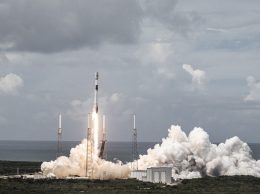SpaceX could resume rocket launches by November
SpaceX on Sept. 23 updated the status of an investigation into a recent explosion at a Florida launch pad that postponed a launch at Vandenberg Air Force Base indefinitely.
The September explosion indefinitely delayed the launch of a rocket originally scheduled to launch from Vandenberg on Sept. 19, but the company said it could resume launches as early as November.
On Sept. 1, a SpaceX Falcon 9 rocket exploded during a static fire test prior to the planned Sept. 3 launch of the Amos-6 communications satellite on the coast of Cape Canaveral, Fla. A $200 million Israeli communications satellite was destroyed in the fire, which Facebook planned to use to bring the Internet to under-served parts of Africa.
The explosion happened while propellant was being added to a fuel tank and was around an upper oxygen tank. SpaceX said in a statement posted on its website Sept. 23 that the cause of the explosion is still uncertain, but early data suggests a breach of the cryogenic helium system of the second stage liquid oxygen tank took place.
One thing making it difficult to determine the cause of the explosion is that the failure occurred quickly. Just 93 milliseconds passed between initial signs of a failure and the rocket’s explosion during the test, which is designed to test the rocket’s engines before they lift off.
SpaceX did say in the statement the cause of the explosion was unrelated to a June 2015 explosion of a Falcon off the coast of Cape Canaveral less than three minutes into an unmanned mission to resupply the International Space Station. That explosion was blamed on a faulty strut in the rocket’s helium pressure vessels, which help to pressurize the rocket.
The Sept. 19 launch would’ve been the first of seven to send 10 small Iridium satellites into orbit. The launch has been delayed since May because of ongoing maintenance at Vandenberg at buildings used to monitor rocket launches.
Virginia-based Iridium Communications has been hampered by SpaceX’s stalled launch schedule.
In addition to the Sept. 19 launch, another Falcon 9 Iridium launch was tentatively scheduled for late December. After that, five remaining SpaceX launches of Iridium satellites were to happen in 60-day intervals.
Iridium customers who intend to use the satellites once in orbit and operable have also been hampered by the delays.
“We will work to resume our manifest as quickly as responsible once the cause of the anomaly has been identified by the accident investigation team,” the statement said. “Getting back to flight safely and reliably is our top priority, and the data gathered from the present investigation will result in an even safer and more reliable vehicle for our customers and partners.”
It’s still unclear which launch will be next on SpaceX’s launch manifest, but the Vandenberg launch was SpaceX’s next scheduled launch after the Amos-6 satellite’s launch.
• Contact Philip Joens at [email protected].











